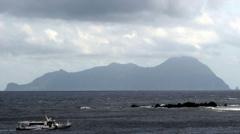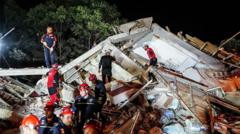The remote Tokara Islands in southern Japan have been rocked by over 900 earthquakes in the past two weeks, leading to heightened anxiety among the local population of around 700. While no damage has been reported, residents are stressed and sleepless, bracing for potential evacuations amidst concerns about a larger quake.
Over 900 Earthquakes Strike Japan's Tokara Islands, Causing Sleepless Nights for Residents

Over 900 Earthquakes Strike Japan's Tokara Islands, Causing Sleepless Nights for Residents
A series of more than 900 earthquakes has left the 700 residents of the Tokara Islands on edge, with anxiety and sleep deprivation becoming a common concern amidst fears of a larger seismic event.
The Tokara Islands, a chain of 12 islands in southern Japan, have encountered heightened seismic activity, including a significant 5.5 magnitude earthquake on June 21. Over the past two weeks, there have been more than 900 quakes reported, impacting the daily lives of around 700 inhabitants across seven of the islands. Residents expressed their fears, with one noting, "It's very scary to even fall asleep," indicating the pervasive anxiety stemming from constant shaking.
While there have been no damages or tsunami warnings, local authorities have urged preparedness for possible evacuations. The experience of the earthquakes has led to a collective feeling of terror and fatigue among the locals. "You can hear a strange roar from the ocean before the quakes hit, especially at night. It's eerie," reported resident Chizuko Arikawa, highlighting the psychological toll of the situation.
Historically, the Tokara area has faced clusters of earthquakes, but the intensity and frequency of these recent shocks are considered abnormal. Japan’s geographical positioning along the Pacific Ring of Fire makes it one of the world’s most seismically active regions, leading to about 1,500 earthquakes annually.
As the tremors continue, some village authorities have advised media outlets to refrain from overwhelming locals with inquiries, as sleep-deprivation effects become apparent. Meanwhile, rumors of a potentially catastrophic earthquake have been fueled by a comic book from 1999, leading to increased anxiety amongst the public and culminating in canceled tourist trips.
In response to the worrying situation, the Japanese government has called for enhancements in disaster readiness, including constructing necessary infrastructures like embankments and evacuation centers to help manage any future seismic events. Despite the history of damaging earthquakes in Japan, particularly the catastrophic 2011 disaster that resulted in over 18,000 fatalities, authorities continue to emphasize the need for preparedness as the reality of the "big one" looms.
While there have been no damages or tsunami warnings, local authorities have urged preparedness for possible evacuations. The experience of the earthquakes has led to a collective feeling of terror and fatigue among the locals. "You can hear a strange roar from the ocean before the quakes hit, especially at night. It's eerie," reported resident Chizuko Arikawa, highlighting the psychological toll of the situation.
Historically, the Tokara area has faced clusters of earthquakes, but the intensity and frequency of these recent shocks are considered abnormal. Japan’s geographical positioning along the Pacific Ring of Fire makes it one of the world’s most seismically active regions, leading to about 1,500 earthquakes annually.
As the tremors continue, some village authorities have advised media outlets to refrain from overwhelming locals with inquiries, as sleep-deprivation effects become apparent. Meanwhile, rumors of a potentially catastrophic earthquake have been fueled by a comic book from 1999, leading to increased anxiety amongst the public and culminating in canceled tourist trips.
In response to the worrying situation, the Japanese government has called for enhancements in disaster readiness, including constructing necessary infrastructures like embankments and evacuation centers to help manage any future seismic events. Despite the history of damaging earthquakes in Japan, particularly the catastrophic 2011 disaster that resulted in over 18,000 fatalities, authorities continue to emphasize the need for preparedness as the reality of the "big one" looms.


















